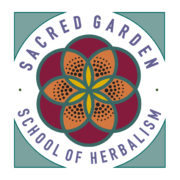UPCOMING EVENTS
Conscious Kids Story & Tea Time
with Lakeja Baylor

Foundational Herbology
9 month program is now enrolling!

Registration closes March 15th
+++++++++++++
Women’s Herbal Wellness Class Series
with Alicia Garza
Grounded Sound Baths
with Terrie Weaver

Fridays February 6th & 13th
5:45 pm
*************
3-Day Immersion: Reading the Body Immersion
with Margi Flint

October 23rd-25th : 10am-4pm
Hold your spot here







Invasive Plant Medicine
/in Herb of the Month /by Ashley DavisDid you know that many “invasive” species are highly medicinal?
Invasive species have been getting a bad rap, with most of the contempt coming from environmentalists who want to protect “native” species from the “invasive” ones. But our well-meaning comrades are operating under the assumptions that 1) the plants that were on our continent before the arrival of Columbus did not also migrate to or from distant lands and 2) that plants that threaten the existing ecological status quo are “bad”.
Kudzu
But who are we to say what plants are good and what plants are bad? I certainly don’t feel qualified to make those kind of judgments. Our perspective is so limited. We assume that because certain foreign plants are out-competing other more familiar plants or creating disturbance in certain areas that they are harmful. That is what appears to be happening when you adopt a human-centric timescale. Now take a moment to consider the long-term view, centuries down the road. What if these plants created different but more resilient ecosystems well-adapted to climate change? What if we stopped fearing that which is different and truly trusted in the intelligence of Nature?
The mentality that prioritizes the familiar over the foreign, that resists change and tries to control the outcome at any cost is part of the dominant paradigm that we are in the process of shedding. We need to shift our point of view and learn to trust in a higher power, surrender our egoic ideals, and be comfortable with not always knowing the answer (aka relishing in the mystery of life).
What if you just entertained the possibility that invasive plants, those relatively new immigrants to our soil, are here to help us restore balance to ecosystems- both external and internal. Whether you agree with this premise or not, it’s time we started using them instead of condemning them. Can we all agree that eating or making medicine with them is better than spraying them toxic chemicals?
Japanese Knotweed
I have had an interest in Invasive Plant Medicine for the past 10 years, since first learning about the value of Japanese Knotweed and what it offers those who are suffering from Lyme. Stephen Harrod Buhner was the firs to notice the correlation between the spread of Lyme and the spread of Knotweed across the United States. Knotweed follows Lyme; turns out it is a most valuable remedy for Lyme as it is both antispirochetal and anti-inflammatory and protective of the heart, nervous system and connective tissue. Then I read a book called “Invasive Plant Medicine” by Timothy Lee Scott and was excited to learn about how the ways that these plants effect humans parallel their effects on the environment.
I do love my native medicinal plants too, and I’m not advocating that we start planting Knotweed in our gardens, but if I found Knotweed growing in my garden or in a place where I did not want it, I would either transplant it to a different location, or lovingly harvest it and use the root rather than scornfully “weed” it from the garden.
“What is a weed? A plant whose virtues have not yet been discovered” – Emerson
This year, my research on immune supporting herbs has strengthened my trust in the intelligence of Nature, as I see how perfectly aligned the medicinal virtues of invasive plants are for supporting humans with in the context of viral infections.
This led me to create a formula composed of 100% invasive plants. Many of these plants are mentioned in a recent article by Stephen Harrod Buhner. (If you would like to review his articles you can find them at his website here). Others are included for their traditional use. Together, they check all of the boxes and offer antiviral activity combined with lymphatic support, heart protection, anti-coagulant properties, and immunoregulating properties (inhibit inflammatory cytokines).
Here is a BRIEF explanation of what each of the herbs in this formula can do:
Japanese Honeysuckle
Japanese Honeysuckle– a potent anti-viral herb. Honeysuckle has been traditionally used in Chinese Medicine to treat flu, colds, sinusitis, sore throat, dysentery and other infections. It is a part of a classic formula called Shuang huang lian that was used with great success in the early 2000s when SARS swept the Asian continent. It is also a component of a classic Chinese formula called Yin Qiao San which is commonly used for influenza with wind-heat patterns.
Japanese Knotweed-antibacterial, antiviral, antifungal, anti-inflammatory, immunomodulating, anti-coagulant, antipyretic, analgesic, cardioprotective, central nervous system protectant and more. Knotweed has so much to offer! It is known among herbalists as one of the best remedies for Lyme-induced joint pain. It also has the potential to balance inflammatory cytokines and protect the endothelial cells, reducing many of the complications that this particular virus can induce. Stephen Buhner says that Knotweed is “highly protective of lymphatic endothelial cells”, and “specific for protecting endothelial cells from inflammatory damage and/or stopping clotting” (Buhner’s article can be found here on his website)
Forsythia
Forsythia Fruit– another antiviral herb with a long history of use in Traditional Chinese Medicine (TCM). It is often combined with honeysuckle for treatment of respiratory infections
Kudzu– the ‘vine that swallowed the South’ also has numerous health benefits. Traditionally it has been used for migraines and alcoholism. It is also a heart protectant, antiviral, antioxidant and can block viral attachment to ACE-2 linkages. And, like Knotweed, it is a powerful regulator of inflammatory cytokines. Between Knotweed and Kudzu alone, every damaging mechanism of the active infection described in Buhner’s article can be addressed.
Sweet Annie
Sweet Annie– traditionally used for fevers, parasites and fungal infections. Sweet Annie is indicated for “heat in the blood” and recently has received a lot of positive attention for its effectiveness in treating tropical blood-borne pathogens. Chances are you have this sweetly aromatic herb growing in your backyard.
Barberry– this thorny shrub covers the new-growth forests in our area. Its roots are highly antimicrobial, and antioxidant. Barberry has been shown to inhibit certain inflammatory cytokines and improve T-cell immunity.
Ailanthus
Ailanthus – another valuable herb from the far East, “Tree of Heaven” is strongly antioxidant, antimicrobial, antiviral, antispasmodic and anti-inflammatory. It has been used historically to treat diarrhea, dysentery, asthma ad malaria. We included a small amount of ailanthus in this formula to help with possible digestive symptoms and overall bodily tension that often accompanies acute viral infection.
Other “Invasive” plants with medicinal value include dandelion, burdock, plantain, thistle, blackberry, garlic mustard, English ivy, Autumn olive, wild rose, purple loosestrife and bindweed. I do not know of medicinal uses for Japanese stiltgrass or Johnson grass, but I am sure that there are other ways that they could be utilized. Johnson grass, for example, could be used for roof thatching or cordage. Let’s use what is abundant and free. If you are going to be pulling out the grass anyway, why not use it and give it an honorable death?
What other ways do you use unwanted weeds? Please comment to this post if you have a favorite use or an idea for a potential use.
Disclaimer: this information has not been reviewed by the FDA. This article is for informational purposes and is not meant to prevent, diagnose, treat or cure any disease or illness.